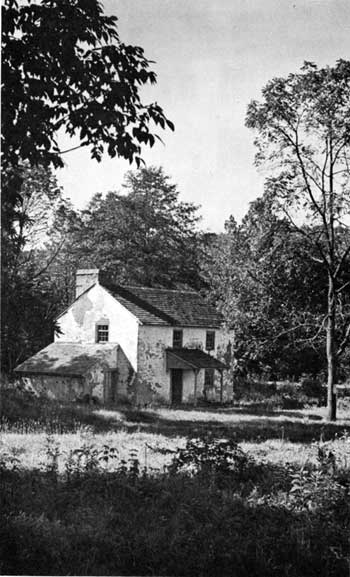|
HOPEWELL VILLAGE National Historic Site |
 |

The oldest of the tenant houses still standing
at Hopewell.
Photo by Hallman.
Mark Bird's Services in the Revolutionary
War
Many of these ironworks figured prominently in the Revolutionary War, for Mark Bird, like many other Pennsylvania ironmasters, was an ardent patriot. In 1775, when the war finally came, he served as lieutenant colonel of the Second Battalion, Berks County militia. Later, in August 1776, as Colonel Bird, he fitted out 300 men of the battalion with uniforms, tents, and provisions—all at his own expense. This force marched under his command to Washington's relief after the Battle of Brandywine in late 1777. He was a member of the Provincial Conference of 1776, and was elected to the Provincial Assembly.
Mark Bird's chief services to the American cause, however, were those of a patriotic philanthropist and munitions-maker, rather than of a soldier. Many of his ironworks, gristmills, and sawmills supplied the Continental Congress with the sinews of war. A report to the executive council of the Continental Congress, dated February 19, 1778, shows that he sent 1,000 barrels of flour to Philadelphia. The minutes of the Continental Congress for June 24, 1777, March 11, 1778, April 8, 1780, and September 10, 1783, refer to large quantities of iron supplies received from him. An interesting order of 1777 discharged 11 men from the militia so that they might be continued in employment "By Colonel Mark Bird, in the cannon foundry and nail works in Berks County in Pennsylvania, carried on by him for the use of the United States." Orders of $50,000 and $125,691 were issued, or recommended to be issued, in 1778 and 1780, respectively, in Bird's favor by the Continental Congress.
It seems very doubtful, however, that the ironmaster ever collected on the large amounts owed to him by the United States. On September 15, 1783, he addressed a memorial to the Continental Congress, requesting that the Great Chain which had been stretched across the Hudson River at West Point to obstruct British navigation be delivered to him in part payment on his account. This plea was denied "on the ground that he was a creditor of the United States along with the others, and no particular order should be given in his behalf".

|
|
Last Modified: Mon, Dec 2 2002 10:00:00 am PDT |


